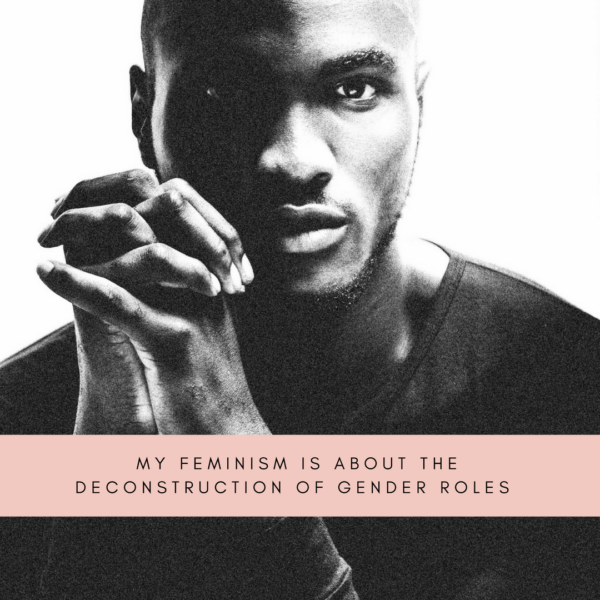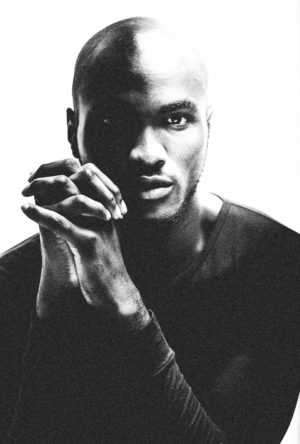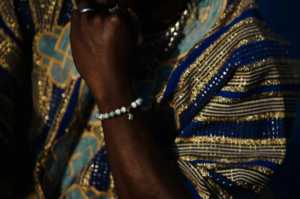
My father raised a feminist son because my mother had died and left him with four children. In our quiet apartment in Ikoyi where tall trees cast shadows on the road outside on warm evenings, I learned to do the things that my mother couldn’t do anymore.
Often times I go back to that place—when I am asked to man up as though I were somehow, in my sensitivity, doing a disservice to the brotherhood of men. The dark thoughts, the fear, and the uncertainty of it all would leave me as I walked down that road most evenings. I’d think of how I arrived here—this young man that I am now. How at nine, I’d noticed that domestic chores soothed my mind and allowed me to feel alive because my extreme paranoia faded and was replaced with the concentration needed to scrub the floor, and drive a knife into four squares of an onion.
I did not find anything remarkable in performing roles that were deemed female, even though sometimes, my chores were disrupted by a house-help sent to us from the East. There was a certain meticulousness I imbibed from watching the food on the stove, from knowing the exact spot I dropped the key to the house every day, from haggling the price of food commodities, which made the sellers slightly irritated, but quietly amused.
In a linear discourse of gender, I would be labelled female for my domesticity. On Sunday afternoons, when guests arrived, I had a desperate need to be liked because it was expected of me. I’d later understand that this was the hollow construction of femaleness—surrendering to a higher power, performing a version of yourself that you haven’t yet mastered, and which in return might leave you feeling fraudulent.
Growing up I embraced my softness as a thing of warmth. If I hadn’t, I would have driven people away with my impudence. In one incident at the end of one summer when I turned twelve, I recall walking away from the first person that called me a faggot for precisely the nature of my softness. My anger too was that of a woman—measured and contained. Often times I was shy about it. I nursed myself into being the custodian of calm, whereas boys went about in fits and spontaneous temperament.
Many years later when I visited home, my father who had raised a feminist son because my mother had died and left him with four children would tell me, “The devil brought in feminism from the back door, a woman must know how to keep a home.” Back door. Keep a home. He had a way of dramatizing his sentences, making them appear fuller, more ferocious. He spoke with the decorum of an artiste who was desperate for his work to be believed.
What my father meant, on that quiet evening in Lagos, was that feminism was an attack on the fundamental biblical rights of men. I know this because no sooner had he said that he added, the Bible said in Ephesians 5, in Proverbs 31 that Women were made to support men, not compete with them. We were discussing the place of women in marriages. I told him I was happy that women were now searching for accomplishments in places that didn’t belong to a man, and even when they searched, and found it unfulfilling, they were brave enough to walk away from it. Why should they walk out? They didn’t do it well. A woman keeps her home.
My feminism is based on a deep understanding of the place of gender in human interactions. It is against measuring or assuming character on trivial activities that might be a direct or indirect response to biology. Novelist Chimamanda Adichie, in an essay on how to raise a feminist child, said, “Biology should not be accepted as justification for any social norm. Because social norms are created by human beings, and there is no social norm that cannot be changed.” I have always believed that people form identities on the basis of their orientation. How to get it right would be to teach a child how to do everything and then let them decide what they want to do. How to get it right would be to examine the role of culture and then eliminate aspects of hyper morality.
My feminism is defined by the recognition that men are disadvantaged by binary notions of gender and would benefit from the dismantling of these binaries. Not all men are boorish, insensitive and sexually aggressive. Not all women are soft and nurturing. Many years ago I began to understand that the compass of feminism on a cultural level is dependent on the value that has been placed on maleness and femaleness. There is a belief that the job of womanhood must be practiced with the right amount of compassion and discipline, whereas a man is allowed to define himself in terms that falls within the tortured satiric genius or the wicked arrested adolescent. My feminism is about the deconstruction of gender roles; it is aimed at developing the supremacy of choice, and in a way I believe this is what people find the most threatening. Choice blusters power.
I often say that the concept of feminism is like the concept of love—it has to be thoroughly understood to be easily assimilated. But just like love, humans make it hard to grasp. I have encountered certain narratives, like feminists do not want men to hold the door open for them. The other infamous one is that feminists hate men. Or that feminism is an exclusive gathering of people who have an extraordinary amount of intellect.
The idea that education is what authorizes feminism is true, but grossly inadequate in sub contextualization. My father has accused me, albeit lightly, that I learnt the ways of the western world from reading. Feminism to him does not belong in our culture; rather, it’s something foreign and borrowed. But feminism takes more than education; it takes a willingness to examine the core layers of what it is to be human — how we inhabit gender roles we had no say in choosing from birth, roles that we are subsequently muscled into playing out by abiding to set rules; thereby, eliminating every sense of our individuality. Often the idea of branded feminism seeps into a conversation about academic feminism versus social feminism. But we must not discredit those who are in many ways albeit subtly challenging the notion of femininity and masculinity, the people who treat otherness with a dignity and respect that few people would ever think it actually deserves.
I am not a feminist because I make a wicked dish of pasta. I am a feminist because I realized from a young age that the world was full and complex, and in it was a plethora of things I could become, things that were not just male. It was a choice of being something and another thing. I am a feminist because I understand that culture could be an enforcer of stereotypes, which sometimes meant that I was expected to be sanitized, static, manufactured, ever ready to be consumed with no lumps. I am a feminist because I choose to see men and women not for their differences but to acknowledge that they are first humans. This is because if we continue to look at people in terms of what they are not, we strip them of the dignity that comes from the mere fact of their existence. After all, there are behavioral descriptors that can apply just as equally to men and women.
Equal things will be allowed equal grace, equal hurt, and equal permission to exist. I am a feminist because I want to complicate our sense of what gender is, what it should be, and how it is performed. I am a feminist, a part of this movement for the equality of sexes, because I find it necessary that we, including men, examine the privileges that come with being male, and how this has failed not only women but ourselves too.
*Click HERE to learn more about the #MyFeminism essay series. If you enjoyed this essay, stop by on November 22nd to read Pearl Osibu’s contribution to the conversation.
Read the second essay in the series—“The Unwomanly Feminist” by Pearl Osibu—HERE.
Read the third essay in the series— “On the Necessity of Men” by Kola Tubosun—HERE.
Read the fourth essay in the series — “Remembering to Scream” by Wana Udobang HERE.
***************
About the Author:
 Keside Anosike is a Nigerian born writer and editor. Although he often shies away from the former label, Keside negotiates the world with rare lucidity through creative non-fiction stories and photographs on his Instagram profile @kecyfa. He believes strongly in human interactions, and underlines that the true sense of beauty is subjective to our encounter with things and people in the course of a day. Keside is currently studying Media Communications at Middlesex University and working on his debut novel.
Keside Anosike is a Nigerian born writer and editor. Although he often shies away from the former label, Keside negotiates the world with rare lucidity through creative non-fiction stories and photographs on his Instagram profile @kecyfa. He believes strongly in human interactions, and underlines that the true sense of beauty is subjective to our encounter with things and people in the course of a day. Keside is currently studying Media Communications at Middlesex University and working on his debut novel.









Natasha Nsemiwe February 07, 2023 06:51
There was so much wisdom in this. If I could quote my favourite lines, it would encompass the whole essay. I absolutely loved it!